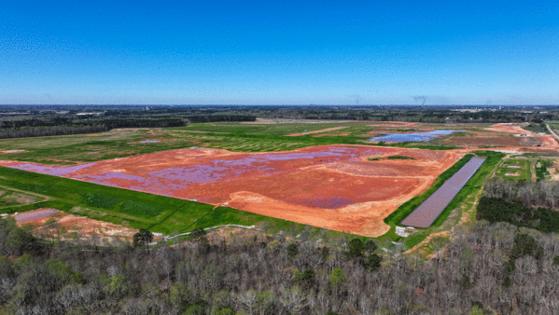Rivian seeking federal loan to restart construction of $5B Georgia plant
Published in Automotive News
New documents show Rivian has applied for a federal loan to help finance the $5 billion electric vehicle factory it plans to build an hour east of Atlanta, the most significant sign the company is making moves to resume construction of the stalled project.
Details about the loan application with the U.S. Department of Energy are limited, but the application is referenced in a draft environmental assessment of the factory site that was posted online in recent days. The precise dollar amount of the loan Rivian is seeking and other details on potential terms were not available.
Asked why it is seeking the assistance and for specifics on the size of the loan, a Rivian spokesman said the company was “unable to comment at this time.” The company also did not directly address whether construction of the Georgia factory is contingent on the DOE’s approval of the loan.
The DOE said it “does not comment on active applications moving through its rigorous evaluation process,” but added that the documents are not an indication that a decision on the loan has been made.
Rivian’s Georgia plant has been billed as the second-largest economic development project in state history and has promised to deliver 7,500 jobs.
But in March, the company announced it was pausing construction indefinitely at the site in southern Morgan and Walton counties and shifting initial production of its new crossover model, the R2, to its existing plant in Illinois. Despite the pause, Rivian repeatedly has said it is committed to building its next factory in Georgia, where it has said it’ll expand production of the R2 and produce two future models.
The DOE environmental review is a required step in the evaluation of Rivian’s application by the agency’s Loan Programs Office.
Residents living near the graded site have made a number of complaints about the environmental impact of the proposed factory, including muddy runoff escaping onto their properties and fouling water supplies. But the assessment reached a preliminary conclusion that the factory would have not have a significant environmental impact. The DOE incorporated an evaluation the U.S. Army Corps of Engineers completed almost two years ago for a key wetlands permit, but also reviewed potential health and quality of life impacts associated with the project, such as noise, traffic and air pollution.
In summary, the draft found “providing a federal loan to Rivian to build an EV manufacturing facility will not have a significant effect on the human environment.”
The assessment provides some insight into when construction of the factory could commence.
A project schedule included in the document shows the company could break ground on the first phase of the factory in the second quarter of 2026, with EV production beginning roughly two and half years later in late 2028. A detailed timeline for Phase 2 of the project, which would expand the plant’s manufacturing capacity to 400,000 EVs a year, is not included, but the report lists the end of 2030 as the target date for completion.
State and local officials offered Rivian $1.5 billion in tax breaks and other incentives to select Georgia for its factory site, most of which only materializes if the company delivers its promised plant and jobs. The company has until the end of 2030 to do so, or Georgia officials can seek repayment of certain subsidies.
If Rivian is approved for the loan, it would join other major Georgia energy and manufacturing projects that have received or been approved for financial backing from the DOE.
In August, the DOE issued a conditional, $1.45 billion loan to the solar panel manufacturer Qcells to aid its completion of a second Georgia factory, which is nearing completion in Cartersville, about 50 minutes northwest of Atlanta. The long-delayed and over-budget expansion of the Plant Vogtle nuclear energy site near Augusta was bolstered by $12 billion in loan guarantees from the DOE.
The news Rivian may be moving to resume construction is the latest in a flurry of developments swirling around the company and its potential Georgia factory.
This summer, Rivian announced a potential $5 billion joint partnership with auto giant Volkswagen Group to develop EV software for both companies’ vehicles. Rivian CEO RJ Scaringe said at the time that the partnership would help bolster its expansion plans.
Earlier this week, the Georgia Court of Appeals delivered a blow to a grassroots group’s legal challenge to local rezoning decisions for the Rivian site when it dismissed the case.
Friday, Rivian announced it is scaling back its manufacturing targets for 2024 because of a shortage of a key in-house motor component used in its EVs.
Cox Enterprises, which owns The Atlanta Journal-Constitution, also owns about a 3% stake in Rivian.
©2024 The Atlanta Journal-Constitution. Visit at ajc.com. Distributed by Tribune Content Agency, LLC.








Comments